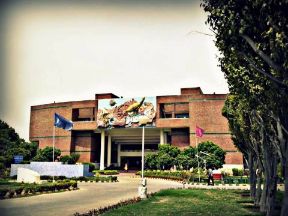General Information
Vision and Mission of the CSE Department
Vision:
To achieve excellence in education, research and technology transfer in the domain of Computer Engineering with the highest standard of professional ethics.
Mission:
- To promote quality education in Computer Engineering through undergraduate (UG) and postgraduate (PG) courses, continuing education and research and development (R&D) activities.
- To incorporate industry orientation by interacting with industrial and R & D organizations to achieve full employability, enable technology transfer, enhance technical and professional competence and design specialized courses.
- To inculcate the spirit of entrepreneurship among students and develop the Science and Technology Park by initiating incubation cells with contribution from students, alumni and faculty.
Program Educational Objectives:
The four year courses aim to achieve the following PEOs.
- Graduates of the program will have successfully technical and professional careers in industry, academia, govt. and entrepreneurship.
- Graduates of the program will hold strong professional ethics with good team skills and communication.
- Graduates of the program will engage in lifelong learning to acquire new knowledge in an evolving technological landscape.
Since 1984, Computer Engineering division, now Computer Science and Engineering is committed to provide a supportive, friendly and challenging environment for teaching, learning and research. Throughout our Bachelors, Masters and Ph. D. programs, our education model focuses on providing breadth and depth of knowledge in a multitude of computing disciplines like computer architecture, databases, networks, embedded systems, real-time systems, software engineering, Data Analytics, Artificial intelligence etc. We strive to educate students as the next generation of engineers capable of becoming leaders in industry, government and academia. It is evident from the fact that all of our students get selected into topmost MNCs from campus placement itself and many of them opt for higher studies in world renowned institutes/universities both in India and abroad.
Courses offered
The Department offers 04 Undergraduate (UG), 01 Postgraduate (PG) and Ph.D. Programmes. PG program M.Tech. (Computer Engineering) is for regular candidates of two years duration and for working professionals of three years duration. The UG programme was started in 1983, right from the inception of the Institute(formerly NSIT). The first PG programme in COE was started in the year 1999. UG programme B. Tech. in Computer Science and Engg. (Artificial Intelligence) has been commenced from the session 2019-20. B. Tech. programme in Computer Science and Engg. (Data Science) has been commenced from 2020-21. In addition, the Department also offers high quality research programmes at the doctoral level.
To keep in pace with the current technological advancements, the UG curriculum has been modified recently with provision for revision/modifications as and when need, so that the students get a feel of what exactly is happening outside in the tech-world.
- B.Tech.-Computer Engineering -COE - (180 students through Choice Based Credit System.)
- B.Tech. – Computer Science and Engineering (Artificial Intelligence) – CSAI - (120 students Choice Based Credit System.)
- B.Tech. – Computer Science and Engineering (Data Science) – CSDS - (60 students Choice Based Credit System.)
- B.Tech. – Mathematics and Computing (75 students Choice Based Credit System.) – This is a joint program being conducted by the Department of Computer Science & Engg. In association with the Department of Mathematics.
- B.Tech.–Computer Engineering. (30 students- Four Semesters -Choice Based Credit System) with AICTE GATE scholarship to all the candidates.
- Doctor of Philosophy(Ph.D.)
Areas of Research
Our research capabilities provide solutions for clients and partners in a wide range of sectors including those listed below.
- Artificial Intelligence
- Soft computing, machine learning, expert system, recommender system, natural language processing, sentiment and emotion analysis, pattern recognition, computer vision.
- Computer Networking
- Cloud computing, mobile computing, broadcasting, wireless sensor networks, semantic web, social network analysis, watermarking, network security, Internet of things, topic modelling, image processing
- Data Science
- Databases, data mining, data warehousing, big data analytics, Bio-informatics.
- Educational Software
- Computational pedagogy, e-learning, instructional software, modeling and simulation, data visualization, human-computer interaction.
- Software Engineering
- Software testing, software quality, software metrics.
Further, the faculty members are open to new and challenging domains with consistent efforts to provide solutions.




